 |
Our Fed Flow of Funds chart-fest gives you the data behind the ugly headlines
Close your eyes and daydream with me. Imagine the waning days of the New Era in 2000, of eToys and pets.com, of Jim Cramer pushing Cisco at $77, of Abbey Joseph Cohen needling her hapless Goldman clients into hanging on in the NASDAQ until their money evaporated. Recall her portrait of the US economy as a “supertanker” able to power through even the worst financial storm the markets and global economy threw at it. Ah, those were the days.
In light of yesterday's Flow of Funds report, I propose an alternative simile for the economy -- not a supertanker but a C-5 Galaxy transport. Like a 332,500 pound aircraft with a stall speed of 120 MPH, the US economy has a stall speed of $4 of new private sector debt per dollar of GDP growth. As the data below show, the credit-financed US economy, when it is not propelled forward by ever more debt and foreign capital flows, has the glide ratio of a box of rocks.
Yesterday's Fed Flow of Funds report revealed that for the first time since the the Fed started to track household borrowing in 1952, household sector debt actually declined between Q2 and Q3 2008, from $13,943.56 to $13,914.22 to be precise. A $29.34 billion decline out of nearly $14 trillion in total household debt may not sound like a big deal, but as the economic data show, without continuous household sector debt growth to fuel its consumer engines the US economy stalls and plummets.
Join me in a Fed Flow of Funds chart-fest as we pour over the data behind the headlines.
"Now, of course, the crucial weaknesses of such periods -- price inflation, heavy inventories, over-extension of commercial credit -- are totally absent. The security market seems to be suffering only an attack of stock indigestion... There is additional reassurance in the fact that, should business show any further signs of fatigue, the banking system is in a good position now to administer any needed credit tonic from its excellent Reserve supply." - Business Week, October 19, 1929
The first chart depicts the total reserves of the Federal Reserve system. If 1929 levels were "excellent" then surely today's are 1,000 times more excellent. 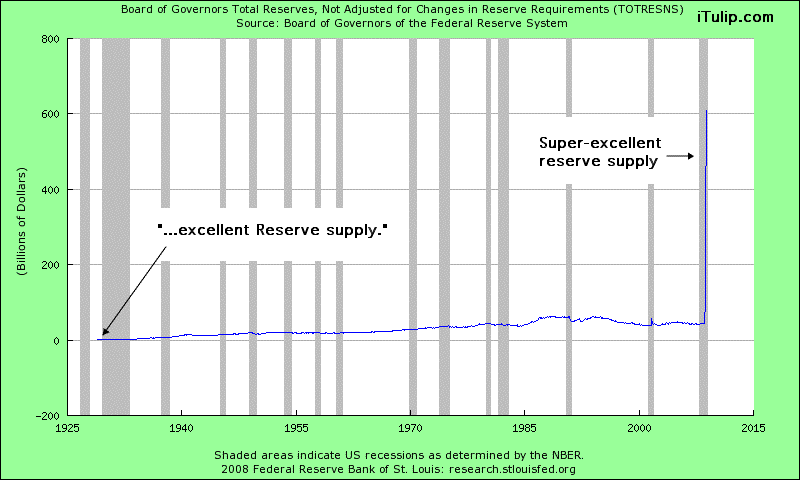
The Fed's excellent reserve supply
"It may be well again to stress the all-important point that the Federal Reserve has it in its power to change interest rates downward any time it sees fit to do so and thus to stimulate business." - Financial World, April 10, 1929
Next we look at the Fed's remaining opportunity to stimulate the economy by cutting short term interest rates further, as the papers reported yesterday is an option that the Fed is "investigating."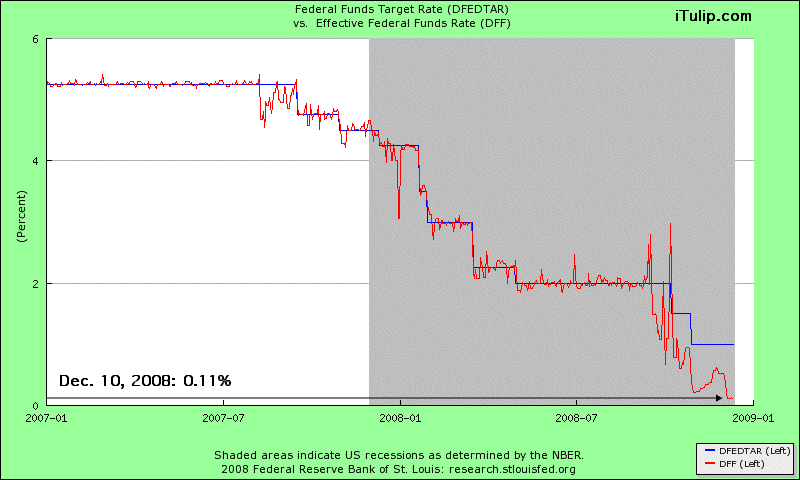
Cut rates from 0.11% to what?
The gambit to lower short rates further strikes me as challenged. The Fed cut the Funds Target to 1% months ago but since then the Effective Fed Funds Rate has only briefly reached half way to that target and is now at 0.11%. As long as the world keeps buying short term US Treasury debt below zero percent, that is not likely to change.
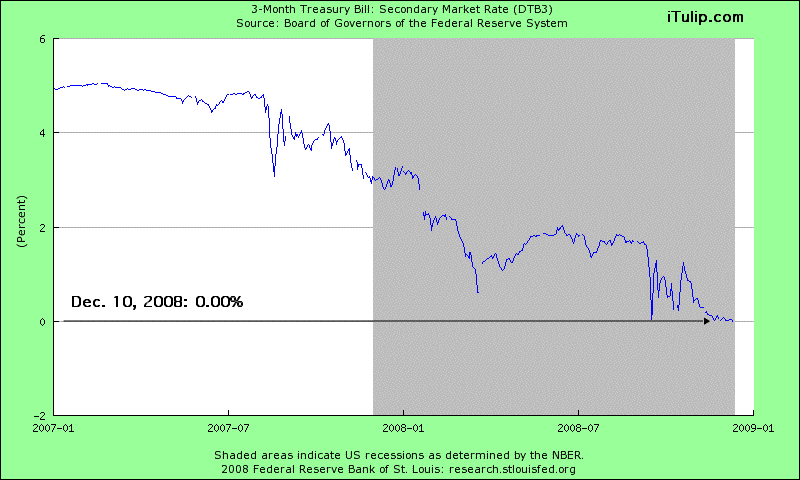
When is a Treasury Bill like a $20 bill? When it's earning nothing.
What will the government do to scare money out of short term Treasury bonds? If a commitment to buy over $7 trillion worth of financial toxic waste, to run up $1 trillion annual Federal budget deficits for ten years starting in 2009, to pile onto a national debt topping $11 trillion while unfunded social liabilities total $45 to $57 trillion, depending on who you listen to, you'd think investors might have more respect for the downside risks of owning US sovereign debt. Then again, if you travel the world you'll quickly find that the US fiscal position is, as Churchill might say, the worst except for all the others. What do you think the riots in Greece are really about?
The dollar did stage a drop in recent days. Was it the suggestion of new trillions of debt? The Fed's trial balloon that it might issue its own debt separate from the Treasury Department? Who knows. In any case the dollar continues to bang its head against a 85 glass ceiling.
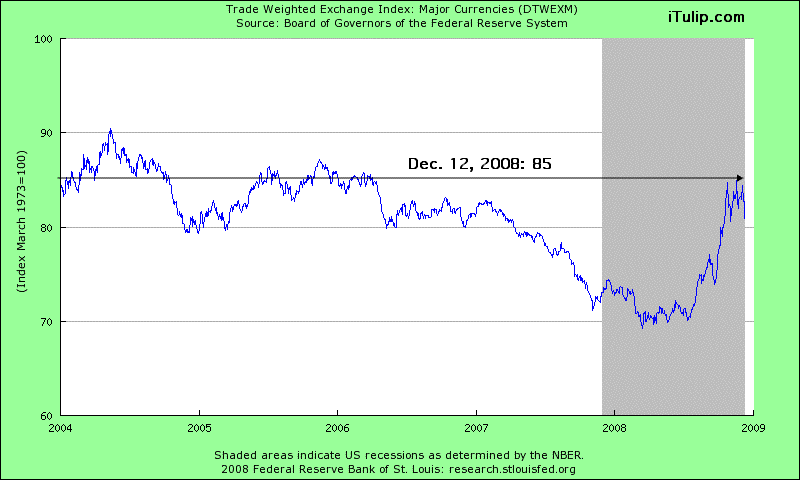
The world's least crappy currency bumps along below 85 after quickly regaining most of its losses since 2006
Not that there is a shortage of dollars on the shelf or currency floating around. Money stock is still rising, albeit at a slower rate, down to a 10% annual growth rate from the torrid 17% rate earlier this year. Look for crisp new bills in your local ATM as the Fed shovels physical cash into the banks to meet demand from customers, this time for real, not like before the Y2K non-event. No wonder at-home safes are selling at a brisk pace.
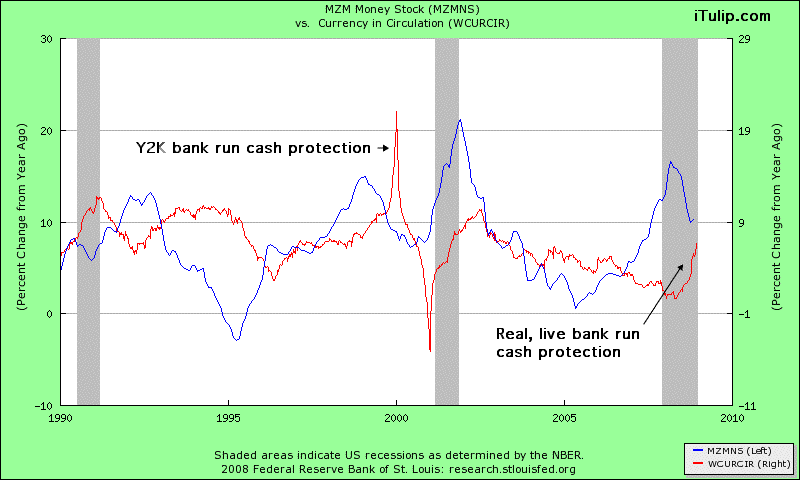
Fed stocking the banks to meet demands for cash
As for the economy itself, the first draw down of household debt in history made the front page of today's Wall Street Journal. That's why we call the current period a "debt deflation" as explained in Irving Fisher's debt-deflation theory, Martin H. Wolfson
"...the modern debt-deflation process encompasses falling asset prices, debt repayment difficulties, a reluctance to lend, a financial crisis, the impact on the banks, and the inter-dependency of the financial system. Recent debt-deflations have been aborted by lender-of-last-resort intervention and government support of the financial system."
The implications for the economy is that the debt engine of economic growth is now running in reverse -- slowly, but for real. (For an analysis of the relationship between asset price deflation and goods and services price deflation in a period of debt deflation see Lessons from Japan: The Devil's in the Details Part I - Asset price deflation versus general prices deflation ($ubscription).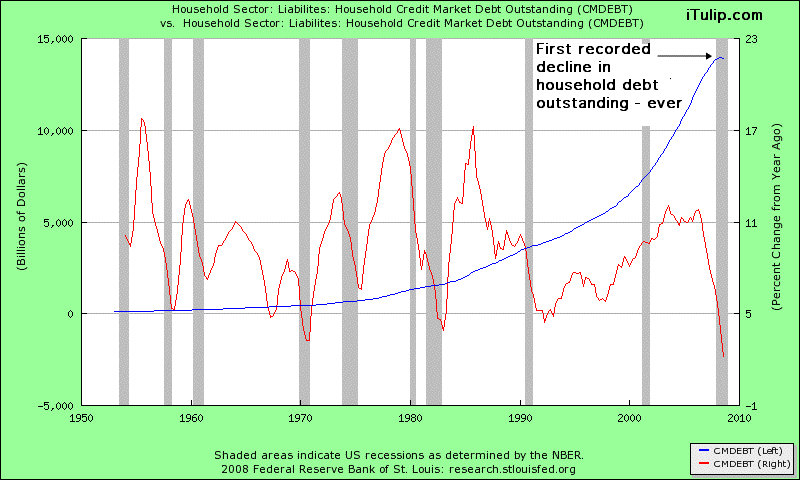
Debt Deflation for real
On the making, buying, and selling stuff side of the economic equation, the data are less than delux. We start with autos and light trucks. Unit volumes are now down to early 1980s levels. Mind you that was when the US GDP was $3 not $13 trillion.
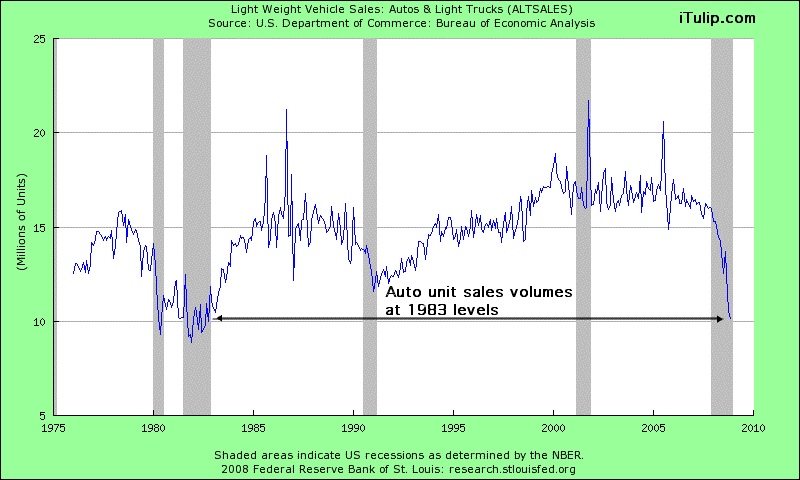
Car sales haven't been this slow since the Falklands Islands War
I can tell you from first hand experience that buying a car today is, well, not like it used to be. The wife's nine year old car forced us to make too many trips to the repair shop so we traded it in for a two year old car and, consistent with advice offered in How Much of Your Car Should You Finance? Zero percent, paid cash. Did we get a good deal? Let's just say if you have cash and need a car, now is not a bad time to buy if you don't mind getting only 30% off list price. No doubt autos will continue to be buyers' market until the millions of cars in inventory are sold off. Rising inventories and falling sales are a problem for businesses generally.
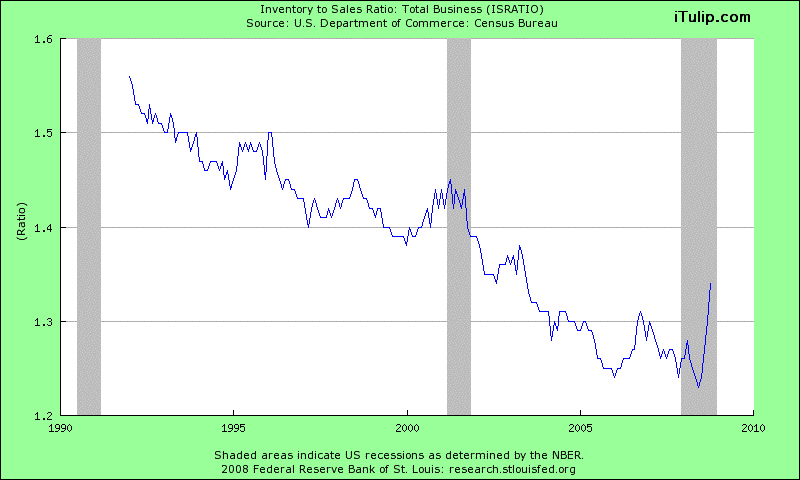
Sales down, inventories up
Retail sales are a disaster generally. The chart below shows retail sales going back to 1947, with dollars on the left scale and percent change on the right. On a percentage change basis retail sales are off as much as during any recession since the end of WWII.
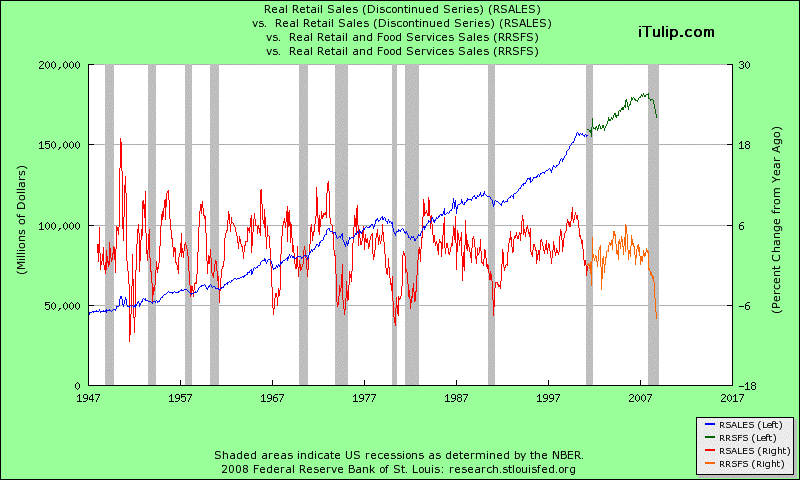
Consumer are not buying
Real wages have declined more year over year than any time since Lech Walesa became the first President of Poland.
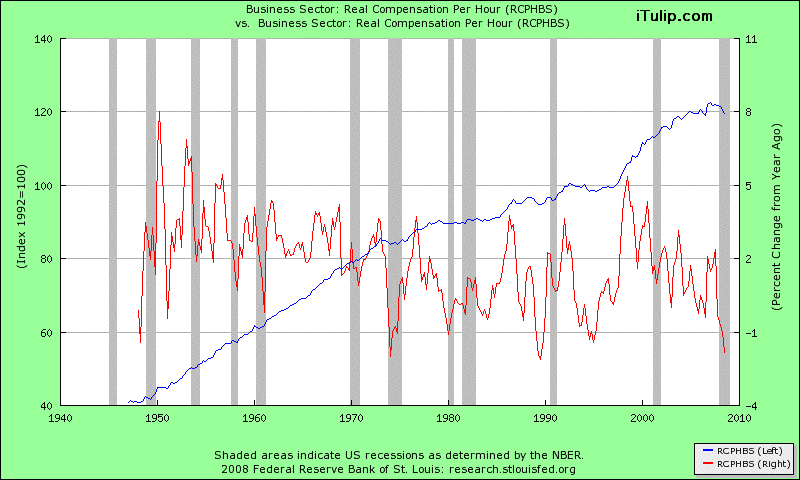
Real wages have declined since the late 1990s but are falling sharply this year
How are consumers feeling about all this? Not good.
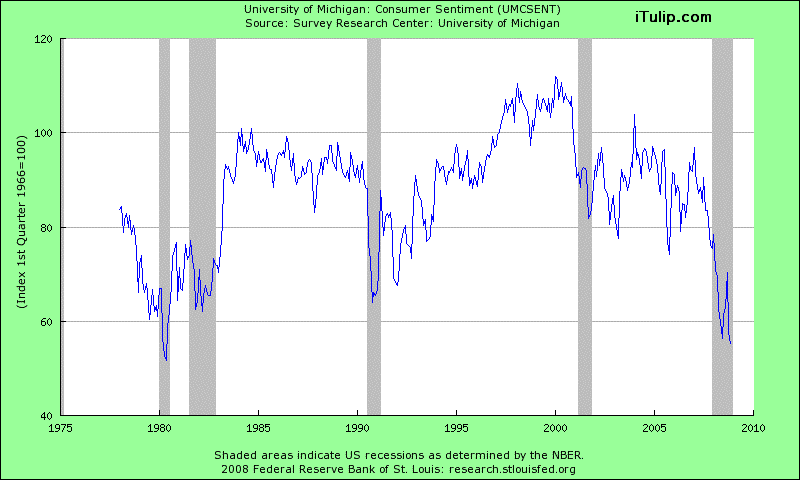
Consumers have not been this glum since Mount St. Helens Erupted in 1980
Exports and imports are down but not as far as during the last recession... yet. If the dollar stays where it is, expect exports to fall off fast.
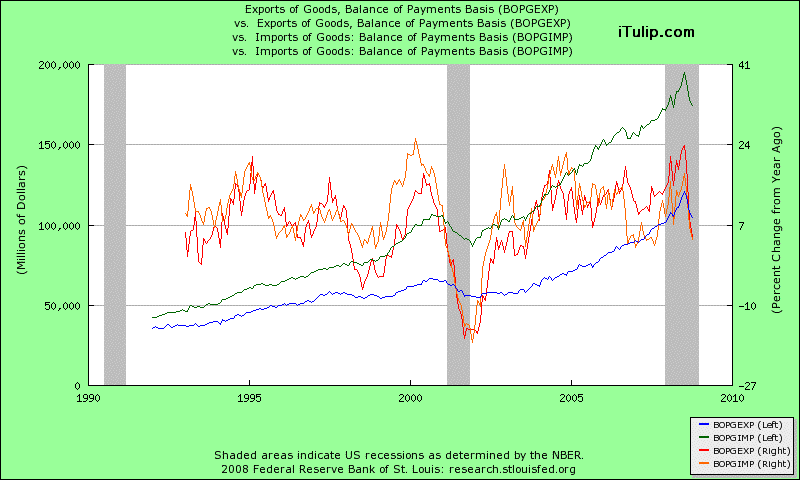
Exports and imports beginning to fall
Producer prices are falling, with inputs like oil way off while intermediate and finished goods prices are also declining but not as sharply. As unit sales volumes decline, wholesalers and retailers attempt to maintain unit prices and use the spread between rapidly falling input prices and sales prices to meet cash flow needs -- input prices fall quickly, output prices slowly. However, we expect this trend to reverse around Q3 or Q4 2009 as the raw and finished goods negative supply shock meets a money supply spike. The prices of both may rise dramatically even before demand picks up.
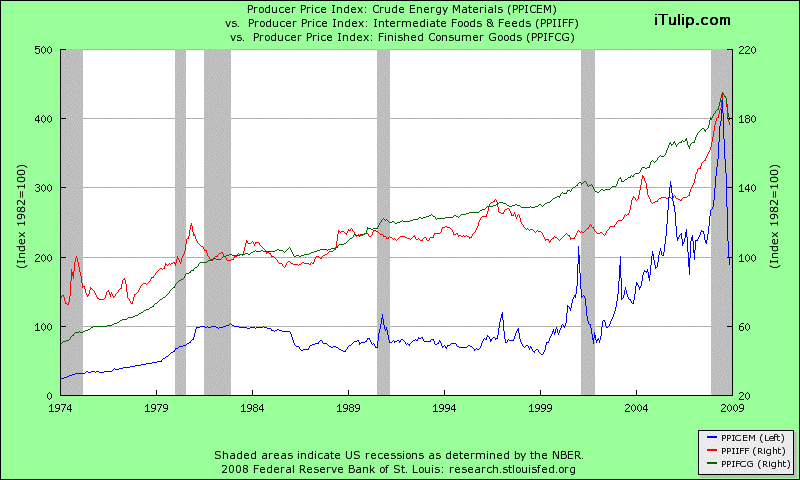
Producer prices are falling, for now
Finally, what's happening with capital flows? The net flow of foreign assets into the US has slowed from $460 billion in Q1 2008 to $26 billion in Q2 2008. Meanwhile, the net flow of US assets to foreign accounts increased from -261 billion in Q1 2008 to $110 billion in Q2 2008.
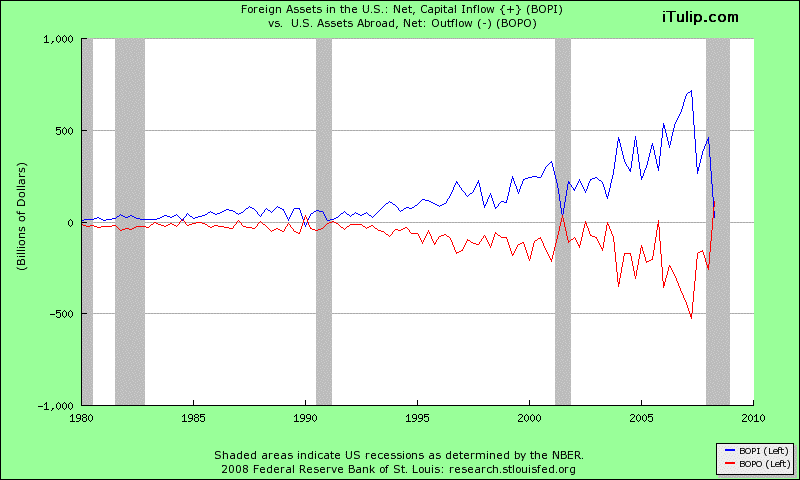
Less foreign money flowing into the USA, more US money flowing out
Add it all up and what do you get? Sorry to say, a deep recession that goes on for years as we've warn you about since March 2006 when we re-opened.
Our advice remains unchanged. If you run a business, the name of the game is: survive your competition. Cut, cut, cut spending. Renegotiate every contract you can to reduce fixed costs. Talk to your employees about accepting pay cuts to avoid layoffs. Cut your own salary, too. Scout out cheaper facilities then call your landlord and renegotiate your rent or move. Remember, in a recession like this one, recovery is not just around the corner. Everything is negotiable.
If you are an employee, if you can't afford a pay cut then you haven't cut expenses enough at home. Round up the family and tell them you are all going to find ways to cut spending, even if it doesn't appear to be necessary yet. Build up your rainy day fund for the real possibility that one income or both family incomes may go away for a year or more. This article How to Cut Expenses and Live More Frugally offers decent advice.
I fully expect this downturn to last for years, but if we all make sound decisions we will all be stronger than ever when we come out the other side.
__________________________________________________
To receive the iTulip Newsletter or iTulip Alerts, Join our FREE Email Mailing List
Copyright © iTulip, Inc. 1998 - 2007 All Rights Reserved
All information provided "as is" for informational purposes only, not intended for trading purposes or advice. Nothing appearing on this website should be considered a recommendation to buy or to sell any security or related financial instrument. iTulip, Inc. is not liable for any informational errors, incompleteness, or delays, or for any actions taken in reliance on information contained herein. Full Disclaimer
Our advice remains unchanged. If you run a business, the name of the game is: survive your competition. Cut, cut, cut spending. Renegotiate every contract you can to reduce fixed costs. Talk to your employees about accepting pay cuts to avoid layoffs. Cut your own salary, too. Scout out cheaper facilities then call your landlord and renegotiate your rent or move. Remember, in a recession like this one, recovery is not just around the corner. Everything is negotiable.
If you are an employee, if you can't afford a pay cut then you haven't cut expenses enough at home. Round up the family and tell them you are all going to find ways to cut spending, even if it doesn't appear to be necessary yet. Build up your rainy day fund for the real possibility that one income or both family incomes may go away for a year or more. This article How to Cut Expenses and Live More Frugally offers decent advice.
I fully expect this downturn to last for years, but if we all make sound decisions we will all be stronger than ever when we come out the other side.
__________________________________________________
To receive the iTulip Newsletter or iTulip Alerts, Join our FREE Email Mailing List
Copyright © iTulip, Inc. 1998 - 2007 All Rights Reserved
All information provided "as is" for informational purposes only, not intended for trading purposes or advice. Nothing appearing on this website should be considered a recommendation to buy or to sell any security or related financial instrument. iTulip, Inc. is not liable for any informational errors, incompleteness, or delays, or for any actions taken in reliance on information contained herein. Full Disclaimer
Comment